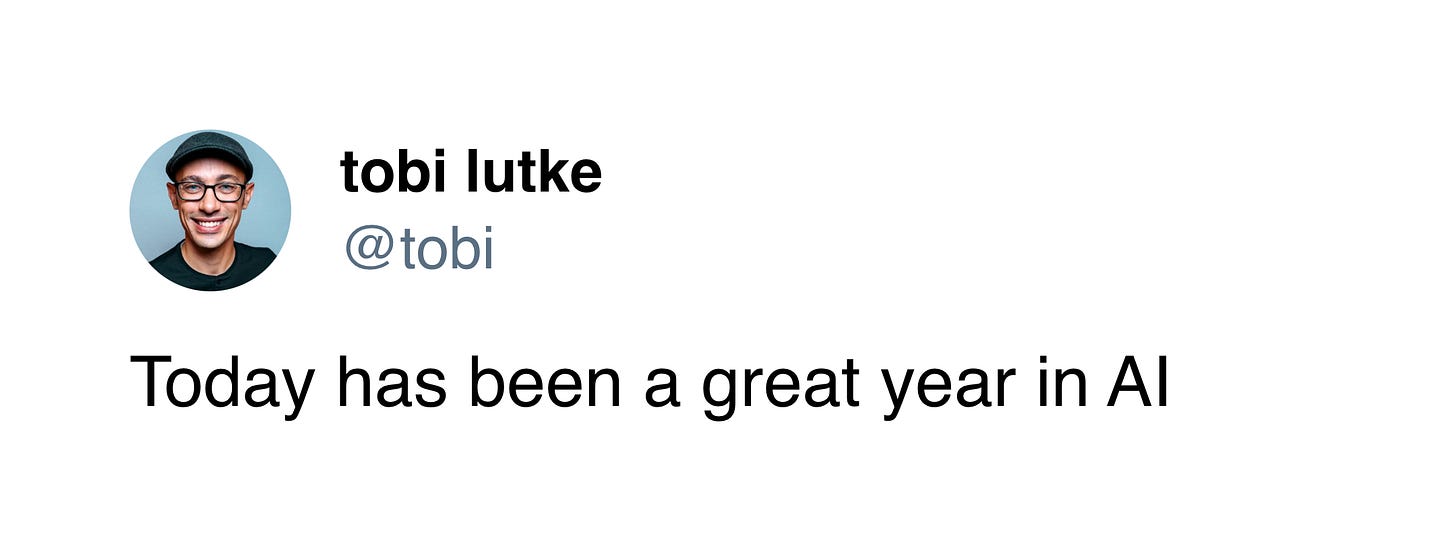I have a confession: I started putting together this piece at the beginning of December, thinking I would release it before the end of the year. I even had an entirely different introduction!
But due to the craziness of the holidays, I couldn't finish it until this week - and in that amount of time, the AI landscape has already seen some major shifts. Let that be a lesson to me on waiting more than a few days to publish something.
So, I hope you'll bear with my slightly delayed predictions for 2025 (along with a scorecard on how I did last year). Happy New Year!
Grading 2024's predictions
Open-source models catch up to GPT-4: A. 2024 marked a watershed moment for open-source AI, with Meta's Llama 3 enabling GPT-4 class performance on consumer hardware. The democratization extended beyond Meta, as Mistral, NexusFlow, Alibaba, and DeepSeek demonstrated capabilities surpassing GPT-4 Turbo in Chatbot Arena evaluations.
Apple's AI: A. Apple's "Apple Intelligence" launch at WWDC 2024 represented the company's embrace of AI technology. The features integrated across iPhones, Macs, and other devices showcased Apple's AI strategy, though initial reviews suggested more sizzle than steak.
A prominent AI company goes bust: B. While outright bankruptcies were rare, 2024 saw notable stumbles in the AI sector. Despite years of development and significant funding, Humane's AI Pin faced disappointing sales, with reports indicating only 10,000 units were sold. On the software side, Character.ai and Cohere were raided for talent as their founding teams departed for larger tech companies.
A realistic AI-generated video goes viral: D. Unfortunately for me, the predicted viral moment never fully materialized. While Coca-Cola's AI-enhanced ad spot sparked backlash from creatives, it fell short of becoming a watershed moment for synthetic media more broadly.
A big media outlet gets bought for training data: B. Rather than outright acquisitions, the industry pivoted toward licensing agreements. OpenAI pioneered this approach with million-dollar annual deals for news content (hundreds of millions, in the case of NewsCorp), with Apple and Google following suit.
AI companions go mainstream: C. If we use Character.AI as a loose proxy for the "AI companion" market, 2024 was decidedly mixed. While usage and valuations were way up (22 million MAUs and $2.5 billion, respectively), the company also saw the loss of its founding team and negative press coverage. That said, even with the growth, dedicated AI companions aren't a trend we're seeing - at least publicly.
A major election is derailed by AI: F. Despite widespread concerns, AI's impact on the 2024 elections proved less disruptive than anticipated. Meta reported only "modest" effects from AI-generated content, and while assessments indicated that foreign actors did employ generative AI, it doesn’t seem to have created major repercussions.
More creative AI monetization: C. While there were a couple of interesting ideas, like Perplexity's "sponsored follow-up questions" program, most AI products continue to use subscription-based or token-based business models.
The AI backlash gets bigger: C. While public concern remained significant, with many Americans worrying about AI's societal impact, the response proved more nuanced than expected. Major federal regulation failed to pass, and most people seem fatigued by the constant barrage of AI news, rather than outraged.
Final Grade C+. Honestly, it's not great. But that means more room for improvement! So, let’s see if I’ve learned something with this year’s predictions.
2025's Predictions
Reasoning models get their moment
When I initially wrote this idea down, Google hadn’t released Gemini 2.0 Flash Thinking Experimental, and OpenAI hadn’t released o3. But the thesis stands: 2025's frontier in AI will be about reasoning capabilities, not just “more parameters.” While larger models are still on the horizon, there's more low-hanging fruit in improving models at inference time (aka “reasoning”). OpenAI's rapid progression from o1 to o3 demonstrates this, and we should expect DeepMind to iterate quickly on Flash Thinking, with Meta and Anthropic likely to release their own reasoning-focused models.
No GPT-5
Here's a potentially spicy take: I don't expect GPT-5 to launch in 2025. The reasoning is simple but compelling - GPT-5 now has too much expected of it. It would need to be “10x better” than GPT-4 to meet the current hype, something unlikely to emerge from simply scaling up pre-training.
Claude 3.5 Opus is rumored to be close to completion, but is stil unreleased, with some pointing to high operational costs and only small improvements over Claude 3.5 Sonnet as an explanation as to why. The reality is that making LLMs better at benchmarks won't necessarily translate to a dramatically improved chat experience - that's more likely to come from product refinement than parameter count.
Better personalization
This may be wishful thinking more than anything else, but I’m betting (hoping?) we see improved personalization when it comes to LLMs. ChatGPT led the way with its “memory” feature, and Gemini now offers something similar. But it’s still surprisingly difficult to build a chatbot experience that truly learns and remembers details about you.
Unlocking these long-term memories is likely a product capability, not a model one. But the industry desperately needs a long-term memory solution for AI-enabled products, and right now we don’t have any sort of best practice.
The age of agents
If you haven't been paying attention to B2B SaaS ads, you might have missed the "agent" marketing hype. Even Salesforce has gotten in on the action, launching "AgentForce" and getting Matthew McConaughey to record new commercials. Going by Silicon Valley marketing departments, agents are about to change enterprise productivity forever.
There is, of course, one problem: nobody can agree on what "agent" means. And while the term is heavily overhyped right now, 2025 will likely be the year we see consumer-oriented agentic AI - particularly in customer service and sales roles.
The results will likely be mixed. While these AI agents will handle certain interactions competently, they'll also reveal the gap between marketing promises and technical reality. We've already seen this pattern in developer tools, where agent capabilities often fall short of the ambitious claims made about them.
Multiplayer mode
Nearly all AI tools are currently “single player” - they only accommodate one user at a time. Yet there’s major untapped potential when it comes to building “multiplayer” experiences that allow for several people to engage with an AI simultaneously.
The Web 2.0 analogy is Microsoft Word to Google Docs, or Adobe Photoshop to Figma. Collaboration opens up entirely new frontiers of creativity and productivity, and the best we can do right now is sharing a ChatGPT conversation that can be continued by someone else. I fully expect more multiplayer products in the coming year.
AI gets a major movie/music credit
Despite the backlash from creatives on using AI, it's clear that producers and executives are keen on incorporating it into their workflows (see: the MPAA's deal with YouTube, and Hollywood's negotiations with studios). Given how long these tools been around for, we've hit a point where we might see AI play a significant role in a hit song or film.
I don’t think this is a crazy prediction by any means - we’ve already seen some seeds planted by way of Taryn Southern's "I Am AI" album and "Where That Came From" by Randy Travis. The latter used AI to recreate Travis's voice from existing recordings, but was more of an editing step rather than a creative one. Rather, I’m betting on a blockbuster or chart-topper that used AI as a crucial component.
Normalized slop AI content
In a similar vein, publishers and marketers alike keep trying to put AI content front and center. From Sports Illustrated to Instagram, there are more ways for AI-generated articles and images to make it into our feeds. So far, the pushback has been immediate and resounding. But could that change?
I think the reality is that unless and until people realize content is AI-generated, they’re perfectly fine with consuming it. Most can’t tell the difference between AI generated paintings and the real thing - it’s the label that causes issues. So as more AI content ends up in more places, there’s a good chance we become desensitized to the label itself - and treat it like everything else on the internet.
Regulation gets dialed back (even more)
This one is probably a bit of a "gimme," given the track record of Trump and Vance on regulation. But it wouldn't shock me if President Trump effectively repealed President Biden's AI executive order and turned over AI regulation to the states. Deepfakes regulation still seems to have bipartisan support, but we've come a long way from proposed AI moratoriums and caps on how many flops can be used to train a frontier model.
The big question is whether Lina Khan remains head of the FTC - she has an appetite for antitrust enforcement within the tech sector, and has made it very clear that she doesn't like the AI oligopoly that's continuing to solidify. Speaking of which:
Corporate consolidation
Since GPT-3, there has been a Cambrian explosion of proprietary and open-source models. But this isn't the 2010s: funding is a finite resource, and training new models is far from cheap. OpenAI, for example, reportedly north of $100 million to train GPT-4. Between AI researchers, GPUs, and data centers, Meta is likely spending billions to release its various open-source models.
There is still value in domain-specific models (i.e. Harvey for lawyers), but ChatGPT/Claude/Gemini are the winners of the general-purpose LLM race. If you’re not a leading model developer, what is your differentiator? There are only so many “LLMs for the enterprise” platforms that can survive long-term. I don’t think these companies can raise much more funding, which would imply more M&A as the year drags on.
Investor hype begins to cool
I was hesitant to include this one, because I think the thesis is right but the timing is wrong. Ultimately, I'm guessing AI startup valuations will hit a crunch between 18 and 24 months from now. But we'll likely start seeing the seeds of that in 2025 - public market investors have already signaled they think AI companies need better ROI - I'm guessing we'll see similar noises from the private markets too.
What’s your take?
Surprisingly, I found it harder to generate predictions this year than last year. It might be a case of AI fatigue, but it does feel like the variety of changes is slowing down (even if the speed isn’t).
But I’d love to hear what you think is on the horizon, AI-wise. Humanoid robots in every home? AI-powered military airstrikes? Let me know in the comments:




